- Home
- Greg Keyes
The Infernal City Page 2
The Infernal City Read online
Page 2
“Why is that important?”
“Oh, Thtal, you made it didn’t you? Without a formula. Remember that stuff that was supposed to make me invisible?”
“It made you sort of invisible.”
“It made my skin translucent. I looked like a bag of offal walking around.”
She drank hers. “No time, Glim. It’s our only hope.”
Their pursuers were coming up the ramp, so she jumped, wondering if she should flap her arms or …
But what she did was fall, and shriek.
But then she wasn’t falling so fast, and then she was sort of drifting, so the wind actually pushed her like a soap bubble. She heard the men hollering from the roof, and turned to see Glim floating just behind her.
“See?” she said. “You need to have a little faith in me.”
She barely got the sentence out before they were falling again.
Later, battered, sore, and stinking of the trash pile that broke their final fall, they returned to her father’s villa. They found him passed out in the same chair Annaïg had been in earlier that morning. She stood looking at him for a moment, at his pale fingers clutched on a wine bottle, at his thinning gray hair. She was trying to remember the man he had been before her mother died, before the An-Xileel wrested Lilmoth from the Empire and looted their estates.
She couldn’t see him.
“Come on,” she told Glim.
They took three bottles of wine from the cellar and wound their way up the spiral stair to the upper balcony. She lit a small paper lantern and in its light poured full two delicate crystal goblets.
“To us,” she said.
They drank.
Old Imperial Lilmoth spread below them, crumbling hulks of villas festooned with vines and grounds overgrown with sleeping palms and bamboo, all dark now as if cut from black velvet, except where illumined by the pale phosphorescences of lucan mold or the wispy yellow airborne shines, harmless cousins of the deadly will-o’-wisps in the deep swamps.
“There now,” she said, refilling her glass. “Don’t you feel more alive?”
He blinked his eyes, very slowly. “Well, I certainly feel more aware of the contrast between life and death,” he replied.
“That’s a start,” she said.
A small moment passed.
“We were lucky,” Glim said.
“I know,” she replied. “But …”
“What?”
“Well, it’s no were-croc, but we can at least report the skooma dealers to the underwarden.”
“They’ll have moved by then. And even if they catch them, that’s a drop of water in the ocean. There’s no stopping the skooma trade.”
“There certainly isn’t if no one tries,” she replied. “No offense, Glim, but I wish we were still in the Empire.”
“No doubt. Then your father would still be a wealthy man, and not a poorly paid advisor to the An-Xileel.”
“It’s not that,” she said. “I just—there was justice under the Empire. There was honor.”
“You weren’t even born.”
“Yes, but I can read, Mere-Glim.”
“But who wrote those books? Bretons. Imperials.”
“And that’s An-Xileel propaganda. The Empire is rebuilding itself. Titus Mede started it, and now his son Attrebus is at his side. They’re bringing order back to the world, and we’re just—just dreaming ourselves away here, waiting for things to get better by themselves.”
The Argonian gave his imitation shrug. “There are worse places than Lilmoth.”
“There are better places, too. Places we could go, places where we could make a difference.”
“Is this your Imperial City speech again? I like it here, Nn. It’s my home. We’ve known each other since we were hatchlings, yes, and if you didn’t already know you could talk me into almost anything, you do now. But leaving Black Marsh—that you won’t get me to do. Don’t even try.”
“Don’t you want more out of life, Glim?”
“Food, drink, good times—why should anyone want more than that? It’s people wanting to ‘make a difference’ causing all the troubles in the world. People who think they know what’s better for everyone else, people who believe they know what other people need but never bother to ask. That’s what your Titus Mede is spreading around—his version of how things ought to be, right?”
“There is such a thing as right and wrong, Glim. Good and evil.”
“If you say so.”
“Prince Attrebus rescued an entire colony of your people from slavery. How do you think they feel about the Empire?”
“My people knew slavery under the old Empire. We knew it pretty well.”
“Yes, but that was ending when the Oblivion crisis happened. Look, even you have to admit that if Mehrunes Dagon had won, if Martin hadn’t beaten him—”
“Martin and the Empire didn’t beat him in Black Marsh,” Glim said, his voice rising. “The An-Xileel did. When the gates opened, Argonians poured into Oblivion with such fury and might, Dagon’s lieutenants had to close them.”
Annaïg realized that she was leaning away from her friend and that her pulse had picked up. She smelled something sharp and faintly sulfurous. Amazed, she regarded him for a moment.
“Yes,” she finally said, when the scent diminished, “but without Martin’s sacrifice, Dagon would have eventually taken Black Marsh, too, and made this world his sportground.”
Glim shifted and held out his glass to be refilled.
“I don’t want to argue about this,” he said. “I don’t see that it’s important.”
“You sounded as if you thought so for a second there, old friend. I thought I heard a little passion in your voice. And you smelled like you were spoiling for a fight.”
“It’s just the wine,” he muttered, waving it off. “And all of the excitement. For the rest of the night, can we just celebrate that your ‘flying’ potion wasn’t a complete failure?”
She was starting to feel warm in her belly, the wine at its business.
“Well, yes,” she said. “I suppose that’s worth a toast or two.”
They drank those, and then Glim looked a little sidewise at her.
“Anyway—” he began, then stopped.
“What?”
He grinned his lizard grin and shook his head.
“You may not have to go looking for trouble. From what I heard, it might be coming for us.”
“What’s this?”
“The Wind Oracle put into port today.”
“Your cousin Ixtah-Nasha’s boat.”
“Yah. Says he saw something out on the deep, something coming this way.”
“Something?”
“That’s the crazy part. He said it looked like an island with a city on it.”
“An uncharted island?”
“An unmoored island. Floating in the air. Flying.”
Annaïg frowned, set her glass down and wagged a finger at him. “That’s not funny, Glim. You’re teasing me.”
“No, I wasn’t going to tell you. But the wine …”
She sat up straighter in her chair. “You’re serious. Coming this way?”
“’Swat he said.”
“Huh,” she replied, taking up the wine again and sinking back into her chair. “I’ll have to think about that. A flying city. Sounds like something left over from the Merithic era. Or before.” She felt her ample mouth pull in a huge smile. “Exciting. I’d better go see Hecua tomorrow.”
And so they finished that bottle, and opened another—an expensive one—and outside the rains came, as they always did, a moving curtain, glittering in the lamplight, clean and wet, washing away, for the moment, Lilmoth’s scent of mildew and decay.
TWO
A boy was once born with a knife instead of a right hand, or so Colin had heard. Rape and attempted murder planted him in his mother, but she had lived and turned all of her thoughts toward vengeance. She laughed when he carved his way out of her and went gleeful
ly into the world to slaughter all who had wronged her and many who had not. And when his victims were drowning in their own blood, they might ask, “Who are you?” and he would answer simply, “Dalk,” which in the northern tongue is an old word for knife.
According to the legend, it happened in Skyrim, but assassins liked the story, and it wasn’t that uncommon for a brash young up-and-coming killer to take that alias and daydream of making that cryptic reply.
The knife in Colin’s hand didn’t feel remotely a part of him. The handle was slick and clammy, and it made his arm feel huge and obvious, hanging by his side just under the edge of his cloak.
Why hadn’t the man noticed him? He was just standing there, leaning against the banister of the bridge, staring off toward the lighthouse. He came here each Loredas, after visiting his horse at the stables. Often he met someone here; there was a brief conversation, and they would part. He never spoke to the same person twice.
Colin continued toward him. There was traffic on the bridge—mostly folks from Weye going home for the night with their wagons and the things they hadn’t sold at market, lovers trying to find a nice place to be secret.
But it was thinning out. They were almost alone.
“There you are,” the man said.
His face was hard to see, as it was cast in shadow by a watch-light a little farther up. Colin knew it well, though. It was long and bony. His hair was black with a little gray, his eyes startling blue.
“Here I am,” Colin replied, his mouth feeling dry.
“Come on over.”
A few steps and Colin was standing next to him. A group of students from the College of Whispers were loudly approaching.
“I like this place,” the man said. “I like to hear the bells of the ships and see the light. It reminds me of the sea. Do you know the sea?”
Shut up! Colin thought. Please don’t talk to me.
The students were dithering, pointing at something in the hills northwest.
“I’m from Anvil,” Colin said, unable to think of anything but the truth.
“Ah, nice town, Anvil. What’s that place, the one with the dark beer?”
“The Undertow.”
The man smiled. “Right. I like that place.” He sighed and ran his fingers through his hair. “What times, eh? I used to have a beautiful villa on the headland off Topal Bay. I had a little boat, two sails, just for plying near the coast. Now …” He raised his hands and let them drop. “But you didn’t come here for any of that, did you?”
The students were finally moving off, talking busily in what sounded like a made-up language.
“I guess not,” Colin agreed. His arm felt larger than ever, the knife like a stone in his hand.
“No. Well, it’s simple today. You can tell them there’s nothing new. And if anyone asks, tell them that no food, no wine, no lover’s kiss is as beautiful as a long, deep, breath.”
“What?”
“Astorie, book three. Chapter—What are you holding there?”
Stupidly, Colin looked down at the knife, which had slipped from the folds of his cloak and gleamed in the lamplight.
Their eyes met.
“No!” the man shouted.
So Colin stabbed him—or tried. The man’s palms came up and the knife cut into them. Colin reached with his left hand to try to slap them aside and thrust again, this time slicing deep into the forearm.
“Just stop it!” the man gasped. “Wait a minute, talk—”
The knife slipped past the thrashing limbs and sank into his solar plexus. His mouth still working, the fellow staggered back, staring at his hand and arm.
“What are you doing?” he asked.
Colin took a step toward the man, who slumped against the banister.
“Don’t,” he wheezed.
“I have to,” Colin whispered. He stooped down. The man’s arms came up, too weak now to stop Colin from cutting his throat.
The corpse slipped to a sitting position. Colin slid down next to him and watched the students, distant now, entirely unaware of what had just happened.
Unlike the two men coming from the city, who were walking purposefully toward him. Colin put his arms around the dead man’s shoulders, as if the fellow had passed out from drinking and he was keeping him warm.
But there wasn’t any need for that. One of the pair was a tall bald man with angular features, the other an almost snoutless Khajiit. Arcus and Khasha.
“Into the river with him now,” Arcus said.
“Just catching my breath, sir.”
“Yes, I saw. Quite a fracas, when all we asked you to do was slit his throat.”
“He … he fought.”
“You were careless.”
“First time, Arcus,” Khasha said, smoothing his whiskers and twitching his tail impatiently. “How slick were you? Let’s get him in the river and be gone.”
“Fine. Lift, Inspector.”
When Colin didn’t move, Arcus snapped his fingers.
“Sir? You meant me?”
“I meant you. Sloppily done, but you did do it. You’re one of us now.”
Colin took the dead man’s legs, and together they heaved him over. He hit the water and lay there, floating, staring up at Colin.
Inspector. He’d been waiting three years to be called that.
Now it sounded like just another word.
“Put on this robe,” Khasha said. “Hide the blood until we get you cleaned up.”
“Right,” Colin said dully.
He got his documents the next day, from Intendant Marall, a round-faced man with an odd ruff of beard beneath his chin.
“You’ll lodge in the Telhall,” Marall told him. “I believe they already have a case for you.” He put down the pen and looked hard at Colin. “Are you well, son? You look haggard.”
“Couldn’t sleep, sir.”
The intendant nodded.
“Who was he, sir?” Colin blurted out. “What did he do?”
“You don’t want to know that, son,” Marall said. “I advise you not to try and find out.”
‘“But sir—”
“What does it matter?” Marall said. “If I told you he was responsible for the kidnapping and murder of sixteen toddlers, would that make you happy?”
“No, sir.”
“What if I told you his crime was to make a treasonous joke about her majesty’s thighs?”
Colin blinked. “I can’t imagine—”
“You’re not supposed to imagine, son. Yours is not the power of life and death. That lies far above you. It comes, in essence, from the authority of the Emperor. There is always a reason, and it is always a good one, and it is not your business, do you understand? You do not imagine, you do not think. You do what you’re told.”
“But I’ve been trained to think, sir. This office trained me to think.”
“Yes, and you do it very well. All of your instructors agree on that. You’re a very bright young man, or the Penitus Oculatus would not have approached you in the first place, and you have done very well here. But any thinking you do, you see, is in service to your job. If you’re asked to find a spy in the Emperor’s guard, you must use every bit of logic at your disposal. If you’re asked to quietly discover which of Count Caro’s daughters has been poisoning his guests, again, use your forensic training. But if you’re given a clear order to steal, injure, poison, stab, or generally do murder, your brain is only to help you with the method and the execution. You are an instrument, a utensil of the Empire.”
“I know that, sir.”
“Not well enough, or you wouldn’t be asking these questions.” He stood up. “You’re from Anvil, I seem to remember. One of the city guardsmen recommended you for testing.”
“Regin Oprenus, yes sir.”
“Without his recommendation, what would you be doing right now?”
“I don’t know, sir.”
But he did, in a general way. His father was dead, his mother barely got by doing laun
dry for the better off. He’d managed to teach himself to read, but his education wouldn’t have gone much further than that, and if it had, it wouldn’t have been of any use to him. At best he might have worked in the shipyard or managed to hire onto a ship. The Imperial invitation had been a dream come true, offering him everything he’d wanted as a young boy.
And that was still the case, despite … this. And now he would draw a salary. He could send his mother some of that before she worked herself to death.
“This is the test, isn’t it?” he said. “Not last night. Now.”
The intendant ghosted a little smile. “Both were tests, son. And this isn’t the last, just the last official one. Every day on this job is a new challenge. If you’re not up to it, the time to say so is now, before you’re in over your head.”
“I’m up to it, sir,” Colin said.
“Very well, then, Inspector. Take the rest of the day off. Report for duty tomorrow.”
Colin nodded and walked away, in search of his new lodgings.
THREE
When Annaïg awoke, Mere-Glim was still sprawled on the floor, his breath rasping loudly.
“Oh!” she muttered as she rose, pressing her throbbing temples, feeling her belly turn.
How much wine had they drunk?
She stumbled her way to the kitchen, winced at the sun as she unshuttered the windows. She built a fire in the stove, then opened the walk-in pantry in the diffuse light and considered the sausages hanging in bundles, the long blades of salted pogfish, barrels of flour, salt, sugar, rice, the pitiful basket of mostly wilted vegetables.
There were eggs on the counter, still warm, so Tai-Tai must be up and doing his job, which wasn’t always the case.
And there was her mother’s antique leather-bound spice case with its seventy-eight bottles of seeds and dried leaves.
Everything she needed.
Mere-Glim wandered in a few minutes after the garlic and chilies hit the oil and the air went sharp and pungent.
“I’m too sick to eat,” he complained.
“You’ll eat this,” Annaïg told him. “And you’ll like it. Old Tenny used to make this for Dad, before we couldn’t afford her anymore.”
“If that’s so, why is it different every time you make it? Last time it had peanuts and pickled pork, not chilies and garlic.”

 Godzilla
Godzilla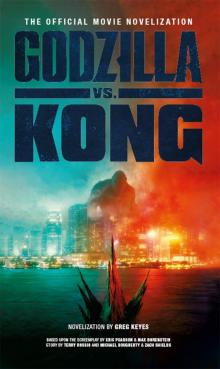 Godzilla vs. Kong
Godzilla vs. Kong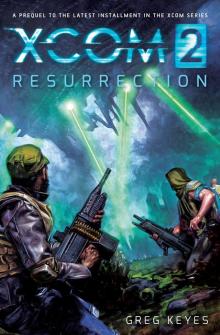 XCOM 2- Resurrection
XCOM 2- Resurrection Independence Day: Crucible (The Official Prequel)
Independence Day: Crucible (The Official Prequel)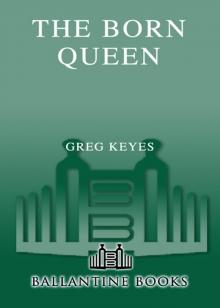 The Born Queen
The Born Queen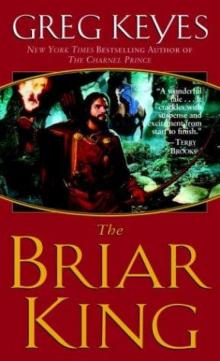 The Briar King
The Briar King Star Wars The New Jedi Order - Dark Journey - Book 10
Star Wars The New Jedi Order - Dark Journey - Book 10 Star Wars: New Jedi Order Book 8b: Emissary of the Void
Star Wars: New Jedi Order Book 8b: Emissary of the Void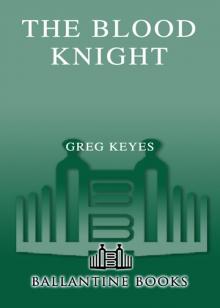 The Blood Knight
The Blood Knight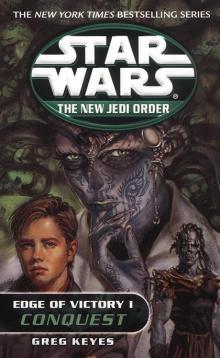 Star Wars - Edge of Victory - Book 1: Conquest
Star Wars - Edge of Victory - Book 1: Conquest Edge of Victory 2 Rebirth
Edge of Victory 2 Rebirth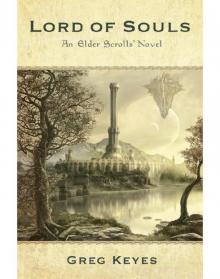 Lord of Souls: An Elder Scrolls Novel
Lord of Souls: An Elder Scrolls Novel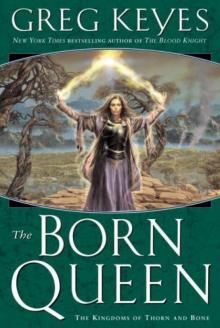 The Born Queen tkotab-4
The Born Queen tkotab-4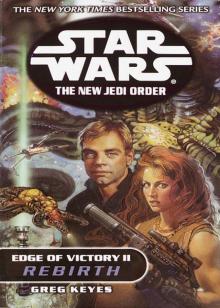 Rebirth: Edge of Victory II
Rebirth: Edge of Victory II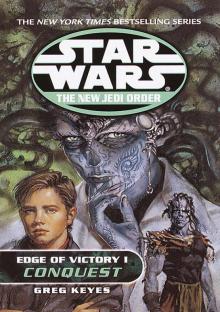 Conquest: Edge of Victory I
Conquest: Edge of Victory I Emissary of the Void
Emissary of the Void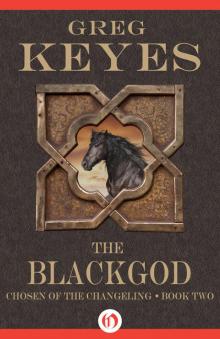 The Blackgod
The Blackgod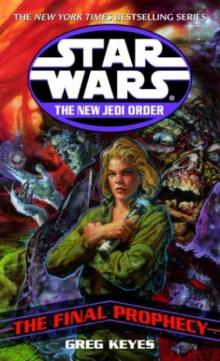 Star Wars The New Jedi Order - The Final Prophecy - Book 19
Star Wars The New Jedi Order - The Final Prophecy - Book 19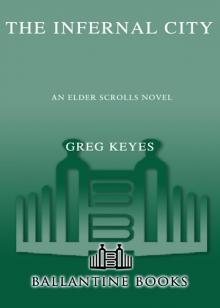 The Infernal City
The Infernal City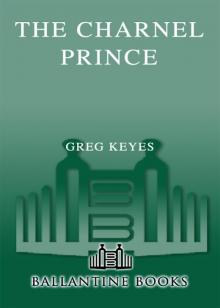 The Charnel Prince
The Charnel Prince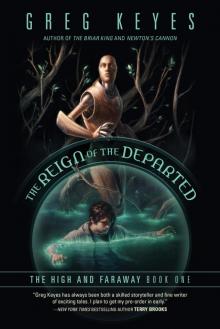 The Reign of the Departed
The Reign of the Departed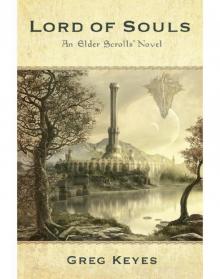 Lord of Souls es-2
Lord of Souls es-2 Chosen of the Changeling
Chosen of the Changeling Dawn of the Planet of the Apes
Dawn of the Planet of the Apes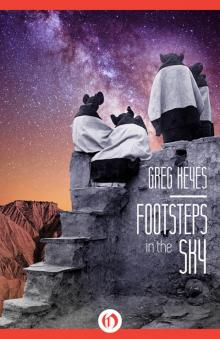 Footsteps in the Sky
Footsteps in the Sky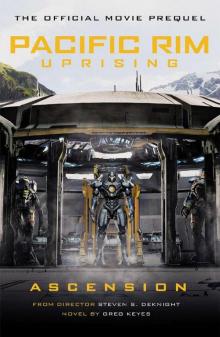 PACIFIC RIM UPRISING ASCENSION
PACIFIC RIM UPRISING ASCENSION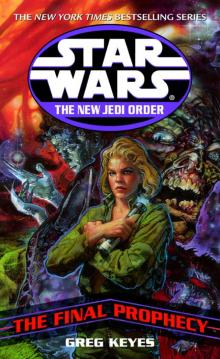 The Final Prophecy: Edge of Victory III
The Final Prophecy: Edge of Victory III